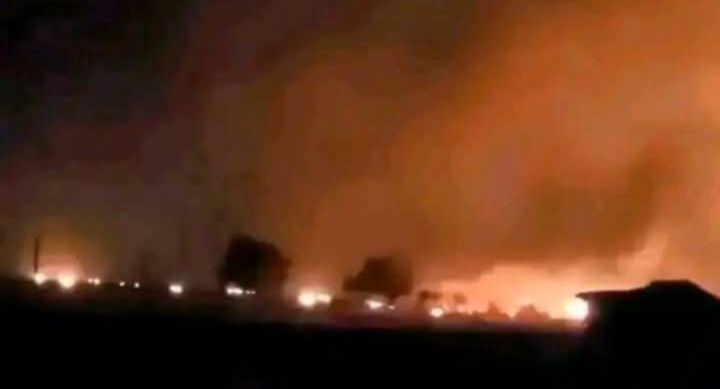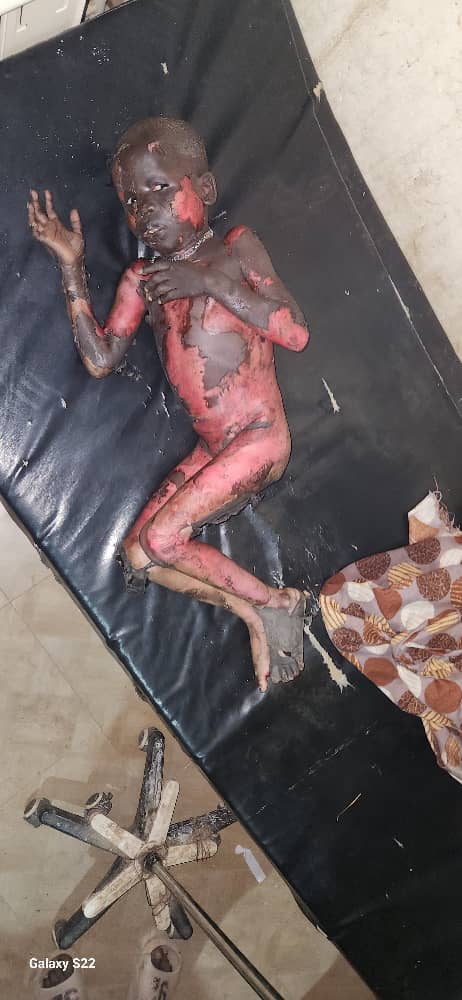Koert Lindijer has been a correspondent in Africa for the Dutch newspaper NRC since 1983. He is the author of four books on African affairs.
It is a war without a name, but a war nonetheless. In South Sudan, planes are attacking the population in opposition areas and tens of thousands of civilians have fled. Uganda has sent soldiers to South Sudan to protect President Salva Kiir in his confrontation with opposition leader Riek Machar. According to some sources, chemicals are used as weapons in airstrikes. What is certain is that the bombs cause extensive burns.
NRC received images of the bombings and of burnt victims in, among other places, the important city of Nassir and the villages of Kuich and Mathiang, which are close to the Ethiopian border. These images have been verified through open source research and the exact locations of the attacks have been identified. It is unclear whether the attacks were carried out by the Ugandan or the South Sudanese air force. Uganda denies involvement.
According to human rights organization Human Rights Watch (HRW), four airstrikes took place in Nassir and surrounding areas in March, killing 58 people and leaving many others burned. “These weapons have killed dozens of people, including children,” writes Nyagoah Tut Pur, South Sudan researcher at the organization.
“The barrels of poison fell from the sky that Sunday evening,” says a community worker who wishes to remain anonymous from Nassir. In the town in the Upper Nile region, which was recaptured by the South Sudanese army this week, he took photos of patients with severe burns after a bombardment on March 16. A nearby clinic received eleven patients in the days that followed, five of whom died from their injuries. “Their burns were very severe,” a doctor tells NRC, “but we lack the expertise to determine whether chemical weapons were the cause.”
News site Sudans Post wrote that there are indications that ethyl acetate, a highly flammable chemical compound, was used. Images verified by NRC show partially melted blue barrels at the locations in question with the text “ethyl acetate” on them.
“Ethyl acetate can be used as a chemical weapon,” says a security expert from Doctors Without Borders, who wishes to remain anonymous for security reasons. “In that case, the chemicals are dropped from a plane or helicopter. The liquid has a low boiling point, which creates vapor. This vapor is heavier than air and spreads quickly and widely across the ground. The vapor is then ignited, which has a huge explosive effect.”
Human Rights Watch interviewed an eyewitness to a bombing in Mathiang who saw the barrels being dropped from a small plane. A 39-year-old woman said: “The barrel came down, I thought it was going to fall on our house… As it fell, the barrels caught fire.” Another eyewitness told how the area where the barrels landed burned for days. Rain eventually put the fire out. “But the smell is still there… and it’s not the smell of gasoline or kerosene,” he said.

Power struggle
South Sudan, the world’s youngest nation, has become one of the most corrupt and poorly governed countries in the world since gaining independence in 2011. It is not a country with an army, but an army with a country, where soldiers become politicians and compete with each other without cooperating. And often they do that competition with weapons. This has created a kleptocracy of warlords.
“South Sudan is not a nation, but a village, a kind of cattle camp,” says politician and author Peter Adwok Nyaba. “National army soldiers rob civilians and the secret service arrests dissidents. South Sudanese no longer dare to speak and when they want to make themselves heard, they express their discontent by rebelling on the basis of tribal origins.”
After gaining independence in 2011, a civil war broke out between Kiir and Machar, killing 400,000 people. Part of it was ethnically based: Kirr is a Dinka, Machar a Nuer. The peace agreement signed in 2018 stipulated, among other things, that a joint army would be established and that free elections would be held. Neither happened.
However, ministers, generals and other officials from the opposition camp were included in the government apparatus. At the end of last year, Kiir began purging them, which led to a new round of military confrontations.
In early March, the White Army, a militia with young fighters that supports Machar, shot down a UN helicopter with government soldiers and a high-ranking commander on board. In a furious response to that attack, President Kiir placed his political rival Machar under house arrest.
That arrest inflamed the situation. In addition to the Upper Nile region, fighting with Nuer soldiers has now also taken place in the southern Equatoria region, near the capital Juba. Perhaps the fighting in South Sudan would be manageable if there was not a simultaneously even bigger war raging in neighboring Sudan. Not only are weapons entering South Sudan via the two warring parties in Sudan – the government army of President Burhan and the Rapid Support Forces (RSF) of General Hemedti – the fighting is also spilling over. Machar soldiers have clashed with the RSF in the border area with Sudan, Machar supporters told NRC. Machar supporters recently went to Port Sudan, presumably to gain support from Burhan. Kiir in turn traveled to the United Arab Emirates, the major supporter of the RSF, to negotiate a loan of 1.5 billion dollars for his financially collapsed government.
Larger-scale conflict
“The war in South Sudan is already in full swing, with more weapons we could have already launched a counterattack,” a family member of Machar tells NRC. “With Machar’s arrest, Kiir has terminated the peace treaty and we are free to fight back.”
Nicholas Haysom of the UN mission in South Sudan warned last week against such a large-scale conflict. “It would not only devastate South Sudan, but the entire region, which simply cannot afford another war.”
This article first appeared in NRC on 17-4-2025


